Match the pictures with their names.

Match the pictures with their names.
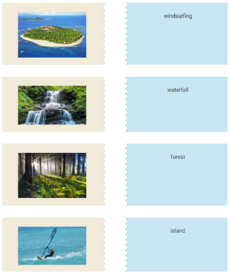
- windsurfing: lướt sóng
- waterfall:thác nước
- forest: rừng
- island:đảo
Match the pictures with their names.
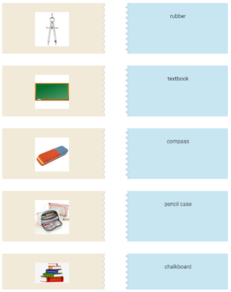
rubber: cục tẩy
textbook: sách giáo khoa
compass: com-pa
pencil case: hộp đựng bút
chalkboard: bảng phấn
Match the pictures with the names of the school activities.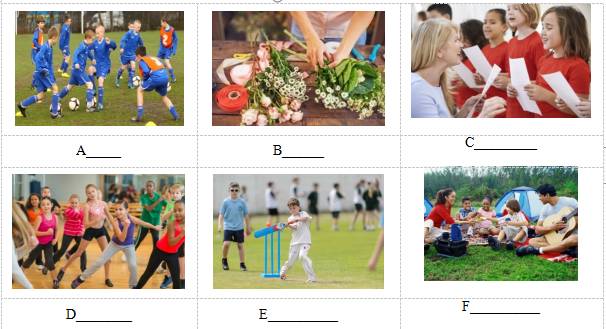
Match the words and phrases in the conversation with their pictures.
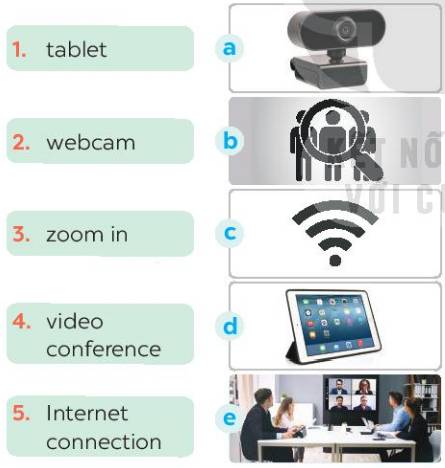
Read the article. Match the highlighted words with their meanings.
Over the past two centuries, different generations were born and given different names. Each generation comes with its characteristics, which are largely influenced by the historical, economic, and social conditions of the country they live in. However, in many countries the following three generations have common characteristics.
Generation X refers to the generation born between 1965 and 1980. When Gen Xers grew up, they experienced many social changes and developments in history. As a result, they are always ready for changes and prepared to work through changes. Gen Xers are also known as critical thinkers because they achieved higher levels of education than previous generations.
Generation Y, also known as Millennials, refers to those born between the early 1980s and late 1990s. They are curious and ready to accept changes. If there is a faster, better way of doing something, Millennials want to try it out. They also value teamwork. When working in a team, Millennials welcome different points of view and ideas from others.
Generation Z includes people born between the late 1990s and early 2010s, a time of great technological developments and changes. That is why Gen Zers are also called digital natives. They grew up online and never knew the world before digital and social media. They are very creative and able to experiment with platforms to suit their needs. Many Gen Zers are also interested in starting their own businesses and companies. They saw so many people lose their jobs, so they think it is safer to be your own boss than relying on someone else to hire you.
Soon a new generation, labelled Gen Alpha, will be on the scene. Let's wait and see if we will notice the generation gap
1. experienced | a. to try or test new ideas or methods |
2. curious | b. went through |
3. digital natives | c. to employ |
4. experiment | d. wanting to know about something |
5. hire | e. people born in the era of technology |
Match. Join the different types shoes to their names.
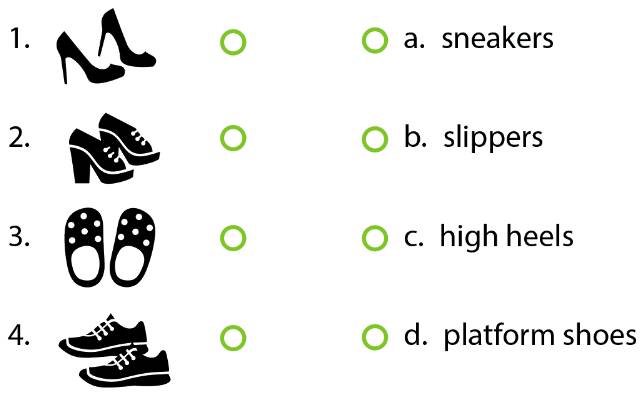
Link video: https://drive.google.com/drive/u/1/folders/12al6rdgZJrmQKjyYghXzQ9cD1e_yDjvt
Match the names of festival with the reasons for holding them
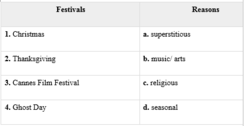
Read some posts on a forum about different social media and match the names of the posters with their activities.
Ann: I think YouTube is the most popular a social media site. I log on to it daily. I upload videos and watch other people’s videos.
Tom: I use Facebook to connect with friends, post pictures, and share others’ posts. I use it daily. It’s user-friendly.
Trang: I love Instagram. It’s really fun, and easy to browse. People like my photos, so I feel happy. That’s why I often check my notifications.
Nam: I have a Facebook page. I don't often update it, but I often use Messenger to discuss schoolwork with my classmates.
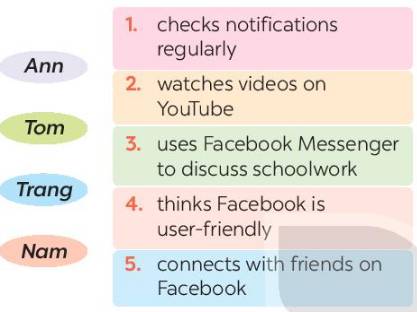
1. Trang
2. Ann
3. Nam
4. Tom
5. Tom
1. Trang: checks notifications regular! (kiểm tra thông báo thường xuyên!)
Thông tin: People like my photos, so I feel happy. That’s why I often check my notifications.
(Mọi người thích những bức ảnh của mình, nên mình thấy rất vui. Đó là lí do tại sao mình thường kiểm tra thông báo.)
2. Ann: watches videos on YouTube (xem các video trên Youtube)
Thông tin: I upload videos and watch other people’s videos.
(Mình đăng tải các đoạn phim và xem các đoạn phim của những người khác.)
3. Nam: uses Facebook Messenger to discuss schoolwork (dùng Facebook Messenger để thảo luận bài trên trường.)
Thông tin: I don't often update it, but I often use Messenger to discuss schoolwork with my classmates.
(Mình không thường xuyên cập nhật nó nhưng mình thường dùng Messenger để thảo luận bài trên trường với các bạn cùng lớp.)
4. Tom: thinks Facebook is user-friendly (nghĩ Facebook thân thiện với người dùng)
Thông tin: I use Facebook to connect with friends, post pictures, and share others’ posts. I use it daily. It’s user-friendly.
(Mình dùng Facebook để kết nối với bạn bè, đăng ảnh và chia sẻ bài đăng của những người khác. Mình dùng nó hằng ngày. Nó thân thiện với người dùng.)
5. Tom: connects with friends on Facebook (kết nối với bạn bè trên Facebook)
Thông tin: I use Facebook to connect with friends, post pictures, and share others’ posts. I use it daily. It’s user-friendly.
(Mình dùng Facebook để kết nối với bạn bè, đăng ảnh và chia sẻ bài đăng của những người khác. Mình dùng nó hằng ngày. Nó thân thiện với người dùng.)
Tạm dịch:
Ann: Mình nghĩ Youtube là mạng xã hội phổ biến nhất. Mình đăng nhập vào nó mỗi ngày. Mình đăng tải các đoạn phim và xem các đoạn phim của những người khác.
Tom: Mình dùng Facebook để kết nối với bạn bè, đăng ảnh và chia sẻ bài đăng của những người khác. Mình dùng nó hằng ngày. Nó thân thiện với người dùng.
Trang: Mình yêu Instagram. Nó rất vui và rất dễ truy cập. Mọi người thích những bức ảnh của mình, nên mình thấy rất vui. Đó là lí do tại sao mình thường kiểm tra thông báo.
Nam: Mình có một trang Facebook. Mình không thường xuyên cập nhật nó nhưng mình thường dùng Messenger để thảo luận bài trên trường với các bạn cùng lớp.
Ann Tom Trang Nam | 1. kiểm tra thông báo thường xuyên 2. xem video trên youtube 3. dùng Facebook và Messenger để trao đổi chuyện ở trường 4. nghĩ rằng Facebook rất thân thiện với người dùng 5. kết nối với bạn bè trên Facebook |
Match the pictures with the statements. *